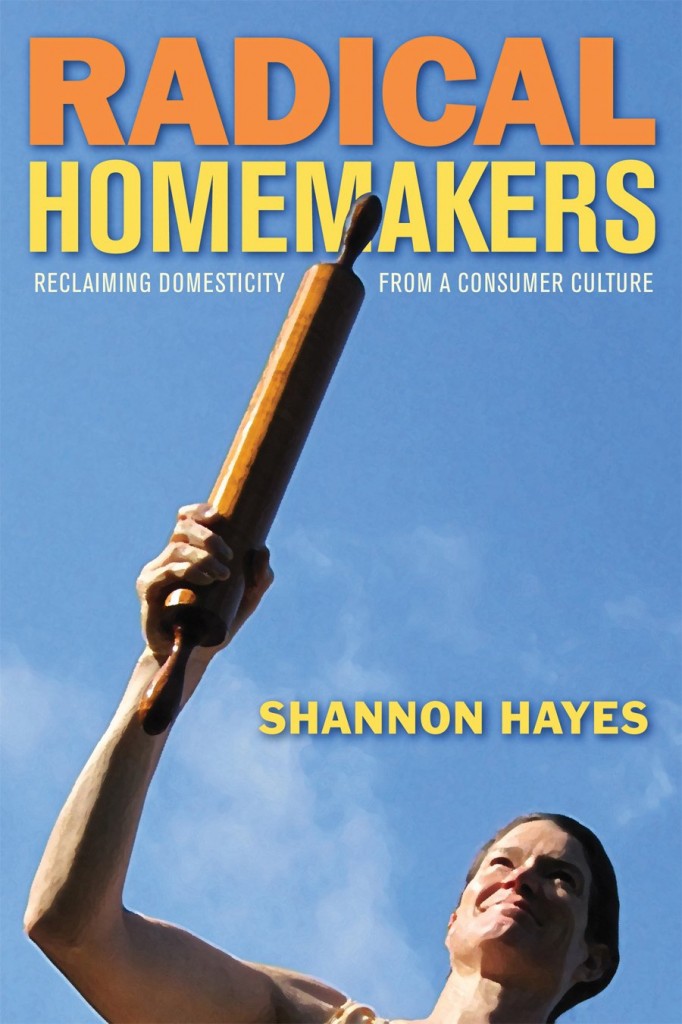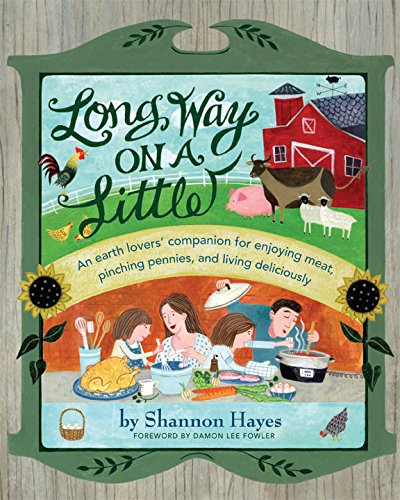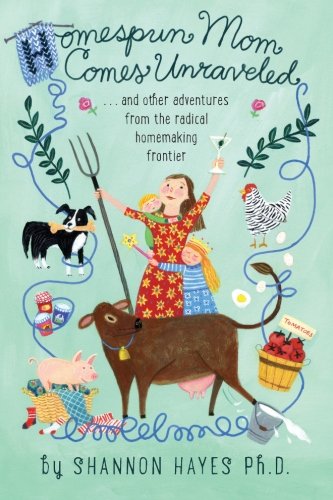A Hearth-Centered Life: The Fantasy – And Reality – Of Homesteading
Will We Become More Hearth-Centered In The Post-Pandemic World?
Editor’s Note: In scouring the frontiers of human consciousness and progressive visions for our human family over the past 15 years, Kindred has been honored and encouraged to discover social change artists like Shannon Hayes, who interviewed women returning to their values of traditional and ancestral relationship-centered hearth-tending/homemaking, an enticing dream today as many of us are quarantined in our homes and possibly reacquainting ourselves with hearth-centered living. But what are the realities of this movement towards a more sustainable life? Shannon shares her insights in her book, Radical Homemaking, where she discovered a shared path of Renouncing, Reclaiming and Rebuilding in the women she interviewed. Below, Shannon answers a recent letter from a follower in her blog revealing the surprising reality of returning to and forging forward a more sustainable life. A cautionary tale, with great sustainable wisdom, as we move forward into our New Story.
Yes, we have reclaimed enough skills to survive a pandemic. (At least I hope we have.) But we’d be miserable if all we did was survive. The potential that chaotic times like these offer is the opportunity to create something better.
Lessons from the Not-So-Happy Homemakers
I received a letter from a reader, Landon, last week that’s prompting this week’s post: He writes: I read your blog post about Coronavirus and saw how every choice you made focused on your community, and then saw how every tier of your Patreon included some kind of giving to the community. Why do you care about people and your community so much (big question, I know)? How does your focus on people and community make your life better?
When I read this email, I had a million different things I wanted to say. Here’s what I settled on for my response, Landon:
It was called Housewives’ Syndrome. Doctors from the 1950s and 1960s used the term to slap a label on the frightening numbers of women suffering depression, hopelessness, anxiety and emptiness. It inspired Betty Friedan to write The Feminine Mystique, and it led to the second wave of feminism.
That was my mom’s generation. As a result, I grew up in the 1980s a latch key kid, doing evening chores with my brother, investing hours into homework and studying so that I’d achieve great test grades, gain entry into the best colleges, and score a meaningful career for myself.
Except it wasn’t all that fun for me. No day at school could compare with a day helping my elderly Appalachian neighbors, Ruth and Sanford, clean their barn. No restaurant could be found that compared to Ruth’s kitchen table and a plate of chicken and biscuits. No material item could be attained that brought more pleasure than wandering the fields, forests and stream banks of West Fulton.
So I watched Ruth and Sanford closely. And I discovered that they were able to have what I considered a first-class existence: they never worried about having enough money, and they never required more than a few thousand dollars to live on each year. And they managed this with domestic skills. They mended, repaired, tinkered, gardened, canned, butchered, berried (yes, they considered that a verb), crocheted, read, played and chatted.
After attaining my own education and career credentials, I decided that theirs was the path I most aspired to. And I wrote a manifesto, Radical Homemakers, on the social, economic, spiritual and ecological significance of this choice.
I wrote about how it works. But in traveling across the country interviewing peers on similar paths, I took in a greater lesson that was little more than a parenthetical section in the book.
I saw when it didn’t work.
I was visiting homemakers and homesteaders in a new millennia. I spent hours around their kitchen tables, teasing out the details of their lives. And that’s when I came to a startling observation. All of them were masters of canning, mending and gardening. But as they slowly divulged their innermost thoughts, I discovered that only some of them were happy. Housewives’ Syndrome doesn’t magically disappear just because someone has noble reasons for adopting a hearth-centered life.
All of them were masters of canning, mending and gardening. But as they slowly divulged their innermost thoughts, I discovered that only some of them were happy. Housewives’ Syndrome doesn’t magically disappear just because someone has noble reasons for adopting a hearth-centered life.
Deep within my notes I began sorting out the men and women I’d interviewed — Looking at their stories, gauging their levels of contentment. And I observed that this radical homemaking path involved three phases. It started with a renouncing period, where a would-be RH-er would study up on all the ways our conventional materialistic culture was failing society and planet. From there, people moved into a reclaiming period, where they recovered domestic skills. They started gardens, hung laundry out on the line, taught themselves to knit, butcher hogs, and build chicken coops.
This reclaiming period was the most photogenic phase. I saw handmade furniture, hand- carved plates and spoons, beautiful sweaters, stocked pantries, lush gardens, contented goats, musical instruments, children adorned in mended hand-me-downs playing with wooden toys and earth clay.
But after a few hours around the kitchen table, I discovered that only some of these people were happy. Ironically, it was the greatest masters of these homesteading skills that struck me as the unhappiest: the ones who took it the farthest with hand-hewn homes and wood piles sorted according to log diameter; the ones homeschooling vast broods of children; or the ones who were so prepped for the next plague or apocalyptic catastrophe that they maintained written inventories of their coffee stores, dried legumes and canned carrots. Their homes were works of art. But their hearts were empty. These were the people who ultimately confessed to feelings of despair and hopelessness.
From there, I honed in on the happiest among them. Those were keepers of the homes that were hardest to photograph, because there was so much more mess and imperfection: failed experiments, more dust, ignored laundry piles. And while messy homes weren’t guaranteed signs of happiness, they were certainly symptoms. The cause of the happiness was something deeper.
From there, I honed in on the happiest among them. Those were keepers of the homes that were hardest to photograph, because there was so much more mess and imperfection: failed experiments, more dust, ignored laundry piles. And while messy homes weren’t guaranteed signs of happiness, they were certainly symptoms. The cause of the happiness was something deeper.
These people weren’t adopting the radical homemaking/homesteading path as a moral justification for their existence. They were using it to leverage their deepest dreams. They had just enough self reliance skills to reduce their dependence on the conventional economy. And they used that freedom to apply themselves to the bigger, tougher projects of making a better world. These people were, in my mind, the phase III Radical Homemakers. They had moved through the renouncing and reclaiming phases, and had entered the rebuilding phase. These were the folks who engaged with the broader community, created organizations and built small businesses.
While the press that covered the radical homemaking movement was fascinated with the picturesque “reclaimers,” those people who could skin a sheep, tan a hide, and weave the fabric that become their childrens’ clothes; I was more taken with the rebuilders. Their less picturesque homemaking skills hinted at the fact that their attention was on the tougher jobs: finding ways to rebuild local food systems, bringing alternative healthcare into the mainstream, changing the way we educate, opening businesses in economic wastelands, designing systems for reducing our ecological impact, addressing political injustices.
I had more affinity with this group, as I had my own focus — to build my own family’s business and make it profitable. I am an entrepreneurial junkie. But just as I saw those reclaimers as victims of housewives’ syndrome, I developed my own hypothesis: a business person could be just as obsessed with the bottom line. He or she could suffer profit-syndrome, a fixation on the bottom line that fails to result in deeper happiness and fulfillment.
Like homemaking, entrepreneurship is only satisfying if it enables you to tackle the bigger projects. For me, that’s changing the economic reality of a community, helping to build deeper relationships, and fostering greater bonds between people and place. Yes, I need to make money. And yes, I enjoy crunching numbers and finding ways to get all the digits to settle into the proper place values. But the joy is only as great as its ability to let me come back and do the bigger spirit-building work another day. I want to use my business to create a deeper, more meaningful life for my community.
Yes, Landon, I suppose Sap Bush Hollow’s community focus does seem a little more apparent in these recent weeks facing the Covid pandemic. As we locked the door to the cafe and closed off the farm, I couldn’t help but recognize the vast wealth, resources and freedom that my family enjoys compared with the rest of the world. We have thousands of acres to wander, seemingly endless food, a daily rhythm that’s only minimally disrupted by social distancing, and miles and miles of wool yarn for all the knitting I could be getting done. But I learned a lot from those radical homemakers I studied a decade ago. Yes, we have reclaimed enough skills to survive a pandemic. (At least I hope we have.) But we’d be miserable if all we did was survive. The potential that chaotic times like these offer is the opportunity to create something better.
And if I focus my energy on that potential, then disinfecting the mail, singing Happy Birthday over and over and over again as I wash my hands, and wearing a mask and gloves aren’t harbingers of bad times. They are part of a spiritual ritual reminding me to apply my mind, body and spirit to the greater work: to let this be an opportunity to make things better. Maybe we’ll succeed this time. Maybe we’ll fail. But with the right focus, no matter what, the journey is going to be a joyous one.




